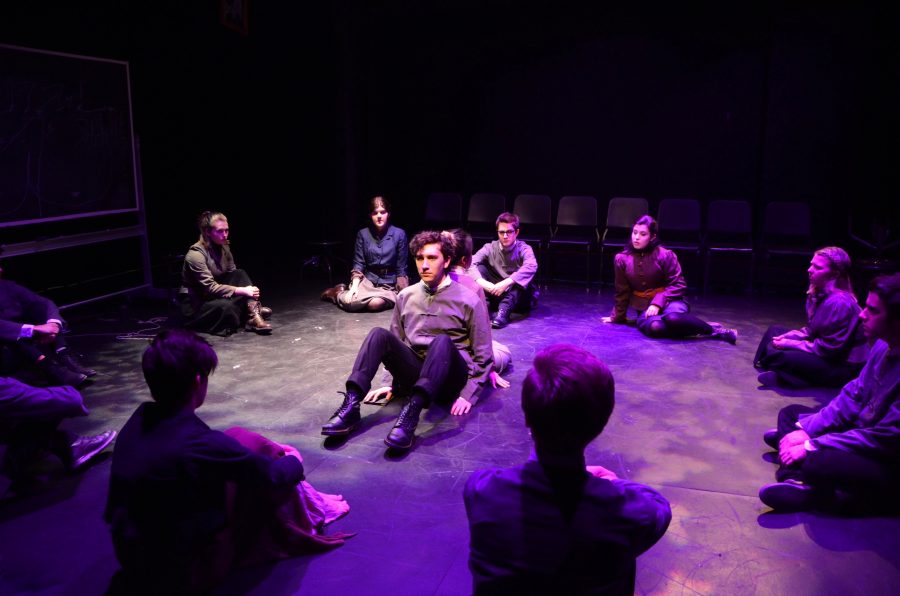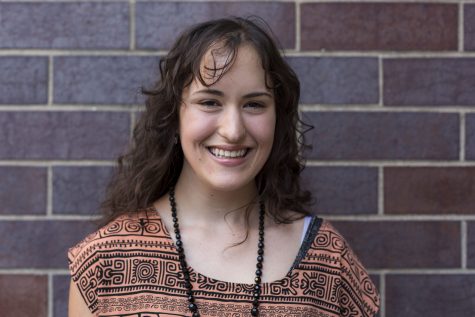‘Spring Awakening’ Reveals Harmonies
Photo Courtesy of Nikhil Saboo
Steinhardt’s “Spring Awakening” captures the issues that come with sexual oppression in the 1800s. The musical ran from March 30 to April 2.
April 3, 2017
This past weekend, Duncan Sheik’s beautiful and challenging modern score of tightly clustered harmonies and Steven Sater’s script for “Spring Awakening” read like breathless poetry. Audience members were in for an emotional rollercoaster reminiscent of those angsty adolescent years during Steinhardt’s sold-out production this past weekend. The musical refuses to apologize for the socially taboo, triumphantly raising serious questions about education, sexuality, morals and authority.
The musical is adapted from Frank Wedekind’s controversial classic drama about the dangers of sexual oppression in the 19th century. Still set in 1800s Germany, the musical follows a group of tormented young adults as they struggle to find meaning in a corrupt world. Much of the story revolves around a chilling question posed by one adolescent, Thea (senior Naree Ketudat), in act one — how they would know what to do if their parents didn’t tell them?”
Senior Cathy Ang brilliantly captured Wendla Bergman’s overwhelming innocence and curiosity, contrasted by the brooding cynicism and rebellious intellect of junior Daniel Youngelman’s Melchior Gabor. The tension between the two was conscientiously crafted, creating an unrest only remedied when their voices seamlessly complemented one another in song. Wendla’s eventual rape was poignant and symbolic, taking place atop a makeshift hayloft formed by four stools and a chalkboard onto which the word “shame” has been written. Traces of chalk lingered on Melchior and Wendla’s clothes as a reminder of their lost innocence.
Meanwhile, hapless Moritz Stiefel (sophomore Dillon Knight Drozdz) is plagued by his sexual naivete, persecuted by his teachers and overwhelmed by his school’s impossible expectations. Drozdz took a different approach to the role, straying from the frustrated resentment of John Gallagher Jr.’s original, in favor of more subdued desperation. His portrayal provided an extremely effective and relatable look into the stigmas surrounding mental illness.
Senior Alex Guhde’s Ilse was ethereal. Throughout the play her character became a bright spot on a dark canvas, delicately pleading Moritz and the audience to “walk as far as my house with me.” Her voice, silently screaming with the hope that they should both see another day, came only moments before the tragedy of Moritz’s gut-wrenching suicide.
“The Dark I Know Well,” a haunting duet about the sexual abuse suffered by Ilse and Martha, played by junior Emily McNally, was a kick in the groin for anyone who has ever doubted the sheer vocal force of the alto. Other shining moments included senior Matt Ross’ coquettish Hanschen and sophomore Tony Carrubba’s equally coy Ernst. Their clandestine romance provided some much-needed comic relief to the story.
Professor Christopher Murrah’s direction was spellbinding, with cast members often functioning as frozen set pieces and multiple voices echoing the demands of omnipresent authority figures. The occasional use of the play’s native German was a much appreciated touch, grounding the audience in the musical’s dramatic origins. The lighting captured the musical’s tone, with introspective blues, innocent greens and jarring yellows, and even it incorporated flashlights into the performance. Adam Fleming’s choreography was controlled and angular, reflecting oppression in its slightest movements. All the vocals in the performance were excellent, with careful Latin pronunciations to boot, and the performers should be proud to have tackled such a demanding score.
At times, however, the orchestra overpowered the cast members. This is an incurable flaw of occupying a small performance space. On the heels of Deaf West’s innovative production, Steinhardt Stage Company’s “Spring Awakening” was truly an accomplishment.
A version of this article appeared in the Monday, April 3 print issue.
Email Alexandra Pierson at [email protected].

























































































































































